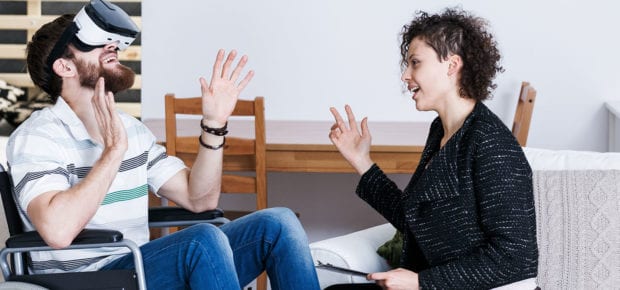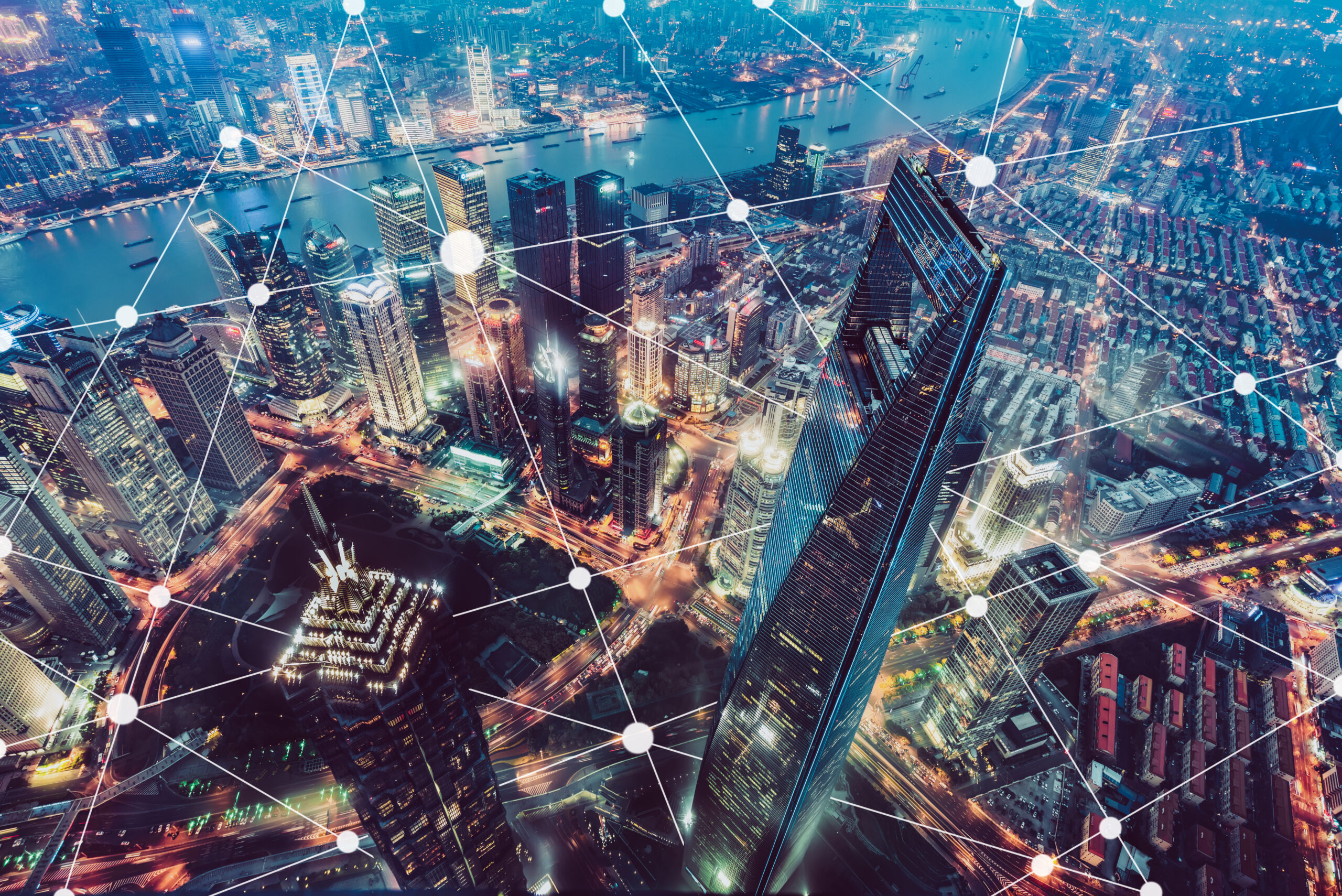October 25, 2017
IEEE Senior Member Dr. Wendy Powell, Reader in Virtual Reality at University of Portsmouth

IEEE Transmitter: What is your area of AR/VR expertise?
Dr. Powell: I work primarily in the use of VR and AR for health and rehabilitation, but I also work across applications in training, education and games.
IEEE Transmitter: Why is AR/VR important? How is it benefiting society today, and how will it benefit society in the future?
Dr. Powell: VR and AR are fundamentally different – they are at the ends of a spectrum which mixes the real and digital worlds.
VR allows us to be immersed in a digitally created world. The computer-generated content fills our vision (and usually our hearing too), blocking out the real world. This enables us to engage in experiences that might not be possible in the real world – for example, to visit ancient civilizations or to view fragile artifacts. It also allows us to have a safe and controlled environment to practice activities that might be dangerous, impractical or unpleasant otherwise. For example, someone recovering from a stroke can practice crossing a busy street, getting used to judging the traffic, navigating around other people etc. Or a traumatized soldier can be safely exposed to PTSD triggers, desensitizing under the supervision of a trained therapist. In the future, we are likely to see a big increase in VR for entertainment and gaming, but also for more serious applications, particularly training and healthcare. As we get better at blending live 360 video and interactive VR, we are also going to see more uses of VR for meetings and socializing, blurring the boundary between what’s real and what’s not.
AR, on the other hand, overlays computer generated content onto the real world, so that we are fully aware of our surroundings, but they are digitally enhanced. Using AR we can supplement the information around us, for example, overlaying a technical manual onto an engine during repairs, showing a surgeon the size and position of a tumor, as they undertake delicate surgery, or giving us a virtual guide to lead us around an unknown city. In the next few years, we are likely to see a proliferation of smart glasses and similar tech which gives us information about our surroundings, people we meet, and supports us in performing a wide range of specialist tasks.
With both of these technologies, we are still in the relatively early days of development, and just beginning to discover the range of applications. As with any new tech, there will inevitably be a proliferation of more questionable applications, with the ethical and moral questions and concerns that will raise. We need to remain vigilant to both the opportunities and the dangers of VR and AR.
IEEE Transmitter: How, specifically, are you are working with AR/VR? What makes your work special?
Dr. Powell: Most of my work at the moment is with VR, as it is the more mature technology., although the recent improvements in AR are looking very promising for some new applications. I do a lot of work looking at the way in which VR actually changes our behavior and perception, and then use that to help rehabilitation specialists build VR applications which meet the needs of their patients. For example, we are currently working with amputees who can get severe pain in the missing limb (phantom pain). We know that if we can trick the brain into thinking the limb is still there then the pain can be reduced, and so we’re using VR to create an illusion that the missing limb is still present, allowing a patient to move it around and interact with VR as if it was really there.
I think that the most important aspect of our work is understanding both the technology but also the human body, so that we can work out how to get the best out of both. It’s very easy now to build a VR application, but actually quite hard to build a good one.
IEEE Transmitter: How can AR/VR benefit the world’s next leaders in research and teaching, medicine and exploration (e.g. space, underwater, archaeology)?
Dr. Powell: I think that the great potential of VR and AR is that they have applications across disciplines. They are a fantastic tool for visualization, for giving us experiences rather than pictures. As well as being good for education, they also raise awareness of important issues. For example, reading about (or seeing a film about) the destruction of the coral reefs doesn’t have anywhere near as much impact as being fully immersed in a VR reproduction or 360 film.
We’ve been doing some work with VR and archaeology recently and again, it’s a great tool to help us see things in a different way. A team at the University of Portsmouth used advanced scanning techniques to see the internal structure of the damaged Mary Rose figurehead, and then we were able to use these scans and contemporary paintings to not only digitally recreate the original, but to allow the archaeologists to examine it in a way that simply was not possible with the physical artifact.
IEEE Transmitter: Where do you see AR/VR heading the next 5-10 years?
Dr. Powell: VR is on a steady upward trajectory – we are moving past the hype, and the performance is improving and the cost is coming down. Good quality VR is now within the reach of ordinary consumers, and I think we will see an increase in VR games, VR location-based experiences, and VR marketing, particularly for high-end products, but also for tourism, house viewings and other areas of visualization.
AR is still not quite as mature, but will be used increasingly for training, and also to support maintenance and engineering tasks, but also in other areas where we want additional information. For example, we might use it to find our way around a building, place an arrow above our destination as we navigate around town, or to overlay information such as product features, special deals or related products in a retail store.
The most important advances are likely to come from the improvements in AI and in eye tracking technology, both of which can help us have much more personalised immersive experiences.
IEEE Transmitter: Do you have any final thoughts?
Dr. Powell: One of the biggest issues at the moment is the mismatch between expectations and reality, which can put people off to VR and AR entirely. The marketing hype leads us to expect something that doesn’t quite exist yet, and the easy access to VR development means that there is also quite a bit of poor quality content being created, which may look very pretty but functions poorly in terms of the overall VR experience.
As we train more VR specialists, and become more familiar with the capabilities of the technology, we’ll become more comfortable with the whole experience and more likely to come back for more.






 Meaningful Momentum or Running in Place?
Meaningful Momentum or Running in Place? AI Through Our Ages
AI Through Our Ages Liquid Infrastructure: Our Planet's Most Precious Resource
Liquid Infrastructure: Our Planet's Most Precious Resource The Impact of Technology in 2025
The Impact of Technology in 2025 Quantum and AI: Safeguards or Threats to Cybersecurity?
Quantum and AI: Safeguards or Threats to Cybersecurity? Why AI Can't Live Without Us
Why AI Can't Live Without Us Bits, Bytes, Buildings and Bridges: Digital-Driven Infrastructure
Bits, Bytes, Buildings and Bridges: Digital-Driven Infrastructure Impact of Technology in 2024
Impact of Technology in 2024 Emerging AI Cybersecurity Challenges and Solutions
Emerging AI Cybersecurity Challenges and Solutions The Skies are Unlimited
The Skies are Unlimited Smart Cities 2030: How Tech is Reshaping Urbanscapes
Smart Cities 2030: How Tech is Reshaping Urbanscapes Impact of Technology 2023
Impact of Technology 2023 Cybersecurity for Life-Changing Innovations
Cybersecurity for Life-Changing Innovations Smarter Wearables Healthier Life
Smarter Wearables Healthier Life Infrastructure In Motion
Infrastructure In Motion The Impact of Tech in 2022 and Beyond
The Impact of Tech in 2022 and Beyond Cybersecurity, Technology and Protecting Our World
Cybersecurity, Technology and Protecting Our World How Technology Helps us Understand Our Health and Wellness
How Technology Helps us Understand Our Health and Wellness The Resilience of Humanity
The Resilience of Humanity Harnessing and Sustaining our Natural Resources
Harnessing and Sustaining our Natural Resources Creating Healthy Spaces Through Technology
Creating Healthy Spaces Through Technology Exceptional Infrastructure Challenges, Technology and Humanity
Exceptional Infrastructure Challenges, Technology and Humanity The Global Impact of IEEE's 802 Standards
The Global Impact of IEEE's 802 Standards Scenes of our Cyber Lives: The Security Threats and Technology Solutions Protecting Us
Scenes of our Cyber Lives: The Security Threats and Technology Solutions Protecting Us How Millennial Parents are Embracing Health and Wellness Technologies for Their Generation Alpha Kids
How Millennial Parents are Embracing Health and Wellness Technologies for Their Generation Alpha Kids Space Exploration, Technology and Our Lives
Space Exploration, Technology and Our Lives Global Innovation and the Environment
Global Innovation and the Environment How Technology, Privacy and Security are Changing Each Other (And Us)
How Technology, Privacy and Security are Changing Each Other (And Us) Find us in booth 31506, LVCC South Hall 3 and experience the Technology Moon Walk
Find us in booth 31506, LVCC South Hall 3 and experience the Technology Moon Walk Virtual and Mixed Reality
Virtual and Mixed Reality How Robots are Improving our Health
How Robots are Improving our Health IEEE Experts and the Robots They are Teaching
IEEE Experts and the Robots They are Teaching See how millennial parents around the world see AI impacting the lives of their tech-infused offspring
See how millennial parents around the world see AI impacting the lives of their tech-infused offspring Take the journey from farm to table and learn how IoT will help us reach the rising demand for food production
Take the journey from farm to table and learn how IoT will help us reach the rising demand for food production Watch technical experts discuss the latest cyber threats
Watch technical experts discuss the latest cyber threats Explore how researchers, teachers, explorers, healthcare and medical professionals use immersive technologies
Explore how researchers, teachers, explorers, healthcare and medical professionals use immersive technologies Follow the timeline to see how Generation AI will be impacted by technology
Follow the timeline to see how Generation AI will be impacted by technology Learn how your IoT data can be used by experiencing a day in a connected life
Learn how your IoT data can be used by experiencing a day in a connected life Listen to technical experts discuss the biggest security threats today
Listen to technical experts discuss the biggest security threats today See how tech has influenced and evolved with the Games
See how tech has influenced and evolved with the Games Enter our virtual home to explore the IoT (Internet of Things) technologies
Enter our virtual home to explore the IoT (Internet of Things) technologies Explore an interactive map showcasing exciting innovations in robotics
Explore an interactive map showcasing exciting innovations in robotics Interactively explore A.I. in recent Hollywood movies
Interactively explore A.I. in recent Hollywood movies Get immersed in technologies that will improve patients' lives
Get immersed in technologies that will improve patients' lives